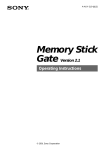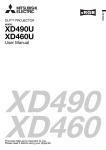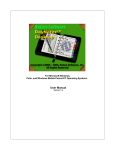Download CardVisor® ID Scanner Software User Manual
Transcript
CardVisor® ID Scanner Software User Manual Age Verification Application About This Document This document describes how to transfer data between the ID scanner and a PC. The ID Scanners come preloaded with software and therefore it is NOT necessary to install software on the PC to operate the ID Scanners. Software must be installed to download the transactions and/or use the VIP/Banned list (CardVisor III & IV customers) • The Green Handspring CD installs the Palm Desktop software on a PC which is used to transfer data to the ID Scanner • The White CardVisor CD contains user documentation and utilities used to create the VIP/Banned lists. See the VIP/Banned section (Cardvisor III & IV customers) for install directions. This document should be used in conjunction with the Handspring Visor user manual (on the Green Handspring CD or available on-line at Handspring.com) and the CardVisor Hardware User Manual. Copyright Copyright 2002 -> 2005 TokenWorks, Inc. Printed in the USA www.TokenWorks.com (Company Web Site) www.CardVisor.com (Product Web site) [email protected] Information in this document is subject to change without notice. No part of this document may be reproduced or transmitted in any form or by any means, electronic or mechanical, for any purpose, without the express written permission of TokenWorks, Inc. TokenWorks, CardVisor and CardTool are trademarks of TokenWorks, Inc. Visor and Handspring are trademarks of Handspring Inc. WWW.CARDVISOR.COM PAGE 2 OF 47 Table of Contents ABOUT THIS DOCUMENT......................................................................................................................................................2 COPYRIGHT ................................................................................................................................................................................2 TABLE OF CONTENTS.............................................................................................................................................................3 DOWNLOADING DATA FROM THE ID SCANNER TO A PC ..........................................................................4 INSTALLING PC SOFTWARE ........................................................................................................................................................4 PALM DESKTOP AND HOTSYNC MANAGER INSTALLATION................................................................................4 DO NOT HIT NEXT UNTIL ENSURING THE ‘I WANT TO USE PALM DESKTOP (PIM SOFTWARE INCLUDED)’ IS SELECTED. .....7 STEP 2 - FIRST HOTSYNC OPERATION & SETTING HOTSYNC USER NAME............................................................................18 EXPORTING DATA FROM PALM DESKTOP ................................................................................................................................20 DELETING DATA FROM HANDHELD ..........................................................................................................................................23 Palm Desktop & HotSync Manager ................................................................ 24 IMPORTING MEMOPAD DATA TO MICROSOFT EXCEL ........................................................................................26 CARDVISOR III VIP & BANNED DATABASE - CREATION AND USAGE .............................................................30 INTRODUCTION ..........................................................................................................................................................................30 DATABASE CONVERSION UTILITY INSTALLATION ...................................................................................................................30 DESCRIPTION OF BAN_VIP_LIST.TXT FORMAT .......................................................................................................................31 HOW THE VIP/BANNED FEATURE WORKS ................................................................................................................................32 Status Codes .................................................................................................... 33 Notes & Limitations ......................................................................................... 33 HOW TO MODIFY THE BAN_VIP_LIST.TXT FILE ......................................................................................................................33 REVIEWING THE BAN_VIP_LIST.TXT FILE ...............................................................................................................................39 CONVERT THE BAN_VIP_LIST.TXT FILE INTO A BAN_VIP.PDB PALM OS DATABASE FILE .................................................40 HOTSYNC THE BAN_VIP.PDB DATABASE................................................................................................................................41 TESTING THE BAN_VIP DATABASE IN THE HANDHELD .......................................................................................43 DATABASE TROUBLE SHOOTING....................................................................................................................................44 ENCODED STRIPE (MAGNETIC & BAR CODE) – FORMATS & RELIABILITY.................................................45 FORMATS....................................................................................................................................................................................45 RELIABILITY...............................................................................................................................................................................45 DOCUMENT INFORMATION...............................................................................................................................................45 LIMITED WARRANTY - CARDTOOL® READER AND/OR CARDVISOR® SOFTWARE ...................................46 AGE VERIFICATION CALCULATION LIMITATIONS ....................................................................................................................47 STATE AND LOCAL PRIVACY LAWS, ORDINANCES OR RULES ................................................................................................47 WWW.CARDVISOR.COM PAGE 3 OF 47 Downloading Data from the ID Scanner to a PC Installing PC Software The Palm Desktop Application is on the Green Handspring CD and is used to transfer data between the PC and the Handspring Visor handheld computer. The Palm Desktop application has the same applications found on the handheld device. The MemoPad application is where the swipe transaction data is store. Also installed with the Palm Desktop is a programmed called the Hotsync Manager whose icon looks like this and will appear in the system task tray located in the bottom right corner of the PC screen when running. It must be running (i.e. displayed in the system tray) to perform a Hotsync. The latest version of the Palm Desktop is version 4.0.1 for Windows and 4.0 for Mac. Visit the Palm web site for a free copy at http://www.palm.com/us/support/downloads/visor/win_desktop_401.html or http://www.palm.com/us/support/downloads/visor/mac_desktop_40.html. The Palm web site is a good resource for the Palm Desktop and Hotsync manager -> http://www.palm.com/us/support/. It has a very good trouble shooting section for Hotsync issues -> http://www.palm.com/us/support/hotsync.html . It is also advisable to read the ‘Advanced HotSync Operations’ chapter in the Handspring User Guide that is also on the Handspring CD. BEFORE HOTSYNC ANY DATA, MAKE SURE THE HOTSYNC PROGRAM IS PROPERLY CONFIGURED AND ALL IMPORTANT DATA IS BACKED UP. Palm Desktop and Hotsync Manager Installation Insert the Green Handspring CD into the CD drive of the computer It should auto launch the following installation screen: WWW.CARDVISOR.COM PAGE 4 OF 47 Read the installation screens and hit continue. After reading, hit Continue. WWW.CARDVISOR.COM PAGE 5 OF 47 Hit Next Screen Shot after hitting Next (do NOT hit Cancel) Hit Next WWW.CARDVISOR.COM PAGE 6 OF 47 If Microsoft Outlook is installed on the PC, the following dialog box will be display. It is vital that Outlook is NOT selected at this point. Do NOT hit Next until ensuring the ‘I want to use Palm Desktop (PIM software included)’ is selected. Switch to ‘I want to use Palm Desktop.’ Selecting Outlook will install PocketMirror, which causes the swipe data stored in the MemoPad application to transfer to Outlook instead of the Palm Desktop. Once Palm Desktop is selected, hit Next Accept default destination folder and hit Next. WWW.CARDVISOR.COM PAGE 7 OF 47 Select USB cradle and hit Next. Select Visor or Visor Deluxe and hit Next. WWW.CARDVISOR.COM PAGE 8 OF 47 With Visor selected, hit Next. Enter a Hotsync User name, we suggest using a YYMMDD format WWW.CARDVISOR.COM PAGE 9 OF 47 Suggest using a MMDDYY format for the Hotsync User name and if applicable append a single character when multiple devices present at one location. Screen Shots during install Screen Shots during install WWW.CARDVISOR.COM PAGE 10 OF 47 Do not set up eMail – Not required – Click No. Screen Shot indicating HotSync Manager is starting WWW.CARDVISOR.COM PAGE 11 OF 47 At this point, make sure you see the HotSync Icon in the bottom left corner of the screen (red/blue circular icon). Make sure the Hotsync Cradle or Cable is connected to the PC and the Handspring Visor. Then Press the HotSync Button on the cradle Ensure Hotsync Manager Icon is visible in system tray – bottom right After pressing the Hotsync button, the Found New Hardware Wizard will appear on the PC screen and the screen of the Handheld will indicate it is trying to connect to the PC. Ignore the handheld for now and continue with installing the software on the PC. WWW.CARDVISOR.COM PAGE 12 OF 47 Select Yes, this time only, hit Next Press Next WWW.CARDVISOR.COM PAGE 13 OF 47 Screen shot showing wizard searching CD for drivers Screen Shot showing wizard installing drivers from CD WWW.CARDVISOR.COM PAGE 14 OF 47 Press Finish Found New Hardware message should appear after pressing Finish WWW.CARDVISOR.COM PAGE 15 OF 47 Now that the drivers are installed, the computer is ready for the first Hotsync. The Handheld will probably have a screen stating “HotSync Problem” - The connection between your handheld acomputer and the desktop could not be established. Please check your setup and try again. Just hit the OK button on the Handheld to clear this message and then Press Hotsync Button on Cradle again, this time the Hotsync process should start and request a User name be selected. WWW.CARDVISOR.COM PAGE 16 OF 47 Select the existing User name or create a new one. Using the existing User name, the Hotsync process should start and when complete, launch the product registration screen. Unclick the Product Registration button WWW.CARDVISOR.COM PAGE 17 OF 47 Click Finish. Congratulations, you’ve installed the PalmDesktop / Hotsync manager and performed the first Hotsync! Step 2 - First HotSync Operation & Setting HotSync User Name Assuming the Palm Desktop software has been installed and that the HotSync manager is running (look for Hotsync icon in system tray located in bottom right of the screen), it is time to perform the first HotSync which will ‘syncronize’ the data between the handheld and the Palm Desktop. Place the handheld in the HotSync cradle or connect it to the PC with a HotSync cable and follow the directions on the next page. If the HotSync window does not open on the Desktop computer: perform each of these steps in order. After each step, try to synchronize. If the HotSync operation succeeds, the problem is resolved and don’t try the next step. 1. Is HotSync Manager on? Before you can synchronize, this software needs to be running. Turn it on if necessary by going to the Handspring folder and double clicking on it. 2. Perform a soft reset on the Handheld: This is a great trick for solving a number of problems. See the hardware reference guide for details. 3. Disconnect your device from the HotSync cable or cradle, and connect it again. Don't press the HotSync button until the device is fully connected. 4. Failure to communicate: Make sure that your desktop computer and handheld device are communicating properly. WWW.CARDVISOR.COM PAGE 18 OF 47 5. Alarms pending? If any Calendar, To Do, SMS, MMS, voicemail, email or other alarms are awaiting a response from you, tap on "OK." 6. HotSync configuration: Make sure you have the right cradle/cable, and your HotSync software is correctly configured. Hit the HotSync button on the cradle/cable and the following dialog box will display. Since this is the first Hotsync, there should be no user names so hit the ‘New” button. Even if there are names already present, hit the New button. If an existing name is selected, then all the data associated with that name will be written to the handheld’s memory and all the license data will be saved in the selected user name which may already have other data. So, hit the New button! Enter a New user name – use the date, e.g. 032204 instead of a name. This will help track subsequent HotSyncs and provide a means to retrieve historical data. After creating the new name, select it for the user name list and hit OK. WWW.CARDVISOR.COM PAGE 19 OF 47 After hitting OK, the Hotsync Progress box should display and confirm the Hotsync is taking place. Once Hotsync is complete, launch the Palm Desktop application, set the User name to the one just created (see user name pull down menu in top right corner) and click on the MemoPad icon on the left menu bar. Shown below is what the Main screen of the Palm Desktop with the Memo Pad active should look like. Check that the number of Memos matches the number of Memos in the Handheld. On the left, the Memo is highlighted and on the right are its contents. If there are no Memos and the HotSync operation worked, ensure that Pocket Mirror was NOT installed. If PocketMirror was installed, go to the add/remove programs, located PocketMirror and remove it. Then reboot the computer to relaunch the Hotsync Manager. Main Screen of the Palm Desk Top showing the Memo Pad Exporting Data from Palm Desktop The Palm Desktop application allows all or selected Memos to be exported in several common formats including comma delimited, tab delimited format, and WWW.CARDVISOR.COM PAGE 20 OF 47 text. This document will use text since CardVisor puts field delimiters in the data (^ character) which the import wizard of Excel and Access can recognize. To start the process, first select the memos, which are to be exported. It is possible to export all or just a subset of the memos to be exported by highlighting the desired memos. Follow the directions below to export just the Memos which are categorized with the “CardVisor” Category. 1.) Set the Category to “CardVisor” - See Category box circled in RED on right. 2.) Place the mouse cursor in the middle of the ‘Description’ window and right click. This will open a small menu, select the ‘Select All’ menu item. See RED circled on right. Then, from the main File menu, select the Export option. Palm Desktop –> File -> Export This will launch the Export As window that determines the file name, format and storage location. WWW.CARDVISOR.COM PAGE 21 OF 47 Export As Window First select the file folder in the Export Window where the file should be saved. Use the Pull Down arrow to change directories. Then Set the Export type as Text (*.txt) as the file Export type Then set the Range for ‘Currently selected records’ Finally, enter a file name that contains the date(s) of the license captures. This will help identify the file later Click on the Export button. Important: Make sure the file extension is “ .txt” and not “ .csv” since files with the “csv” file extension will not cause the Excel import wizard to launch. If accidentally used, the csv file extension can be rename to txt by the file manager and no harm will be done. After hitting the Export button, the program will ask which field of the Memo Pad should be exported. There are three fields in the Memo Pad application; Memo, Private and Category. The Memo field contains the track data, the private field indicates whether the Palm OS should treat the record as private, and the last field is the category. For this example, only the track data will be exported so just check the Memo items. Specify only the Memo Pad field for Export 1.) Check the Memo item 2.) Uncheck the Private and Category items 3.) Hit the OK button After this window closes, the data will be exported and saved to the export file. The Export complete message box should be displayed. WWW.CARDVISOR.COM PAGE 22 OF 47 Deleting Data from Handheld Before deleting the data on the handheld, make sure it is completely transferred to the Palm Desktop and exported to a text file as described above. Open the exported file with a text editor such as Notepad (part of Windows) and examine the first and last line in the file to make sure they match the first and last memo in the handheld’s MemoPad application. If complete, it is safe to delete the data in the Handheld. To be absolutely sure, proceed to the import the data into Microsoft Excel step (next section) and then come back to deleting the data in the Handheld. There are two ways to delete the data from the Handheld. One is to perform a Hard Reset on the handheld and the second is to use the Palm Desktop & Hotsync manager. Deleting Transaction Data via Hard Reset The most direct way to delete the old license data from the Handheld is to do a Hard Reset. A Hard Reset,will erase all the license data on the handheld plus ‘reboot’ the handheld, thus ensuring continued smooth operation. A Hard Reset is like turning off & on your PC. See Hard Reset directions in the Hardware User manual. The basic steps are as follows. 1. 2. 3. 4. 5. Remove CardTool reader Perform Hard Reset – see Hardware User Manual for details Tap on digitizer to center digitizer (follow on screen prompts) Ensure Date/Time are correct when Prefs screen displays Re-insert CardTool reader – this will cause the welcome program to run and associate the Date Book button with the CardVisor application. Press Date Book key & Swipe a License to confirm proper operation. Next, put the handheld back in the HotSync cradle and hit the HotSync button. When the ‘Select a user’ screen displays, hit the ‘New’ button and enter a name using a date format (e.g. MMDDYY or 083005). If there are multiple handhelds being synchronized, the label them A, B, C, thru Z and append the same character to the HotSync name (e.g 083005A or 083005B). WWW.CARDVISOR.COM PAGE 23 OF 47 Do not pick an old/existing name as the Hotsync manager will then push the old transactions into the handheld. Just enter the current date (e.g. 083005) when the ‘New User’ form is displayed. By using this date format for the HotSync name, the transaction data for a specific time frame can be accessed by selecting the HotSync user name in the Palm Desktop (top right corner of the Main Palm Desktop screen). Deleting Data via Palm Desktop & HotSync Manager 1. Open the Palm Desktop Application. 2. Select the Hotsync User name for the PDA you'd like to delete the data from. If you have multiple hotsync names for the same PDA, select the one used during the last Hotsync. 3. Select the MemoPad icon (left side of screen). You should see the Memos appear on the main screen. 4. Go to the Edit Menu item, click on select - > All. This will highlight ALL the Memos. Or you can click on one Memo and which holding down the mouse key, drag down across the Memos you’d like to delete. 5. Go to the Edit Menu and click on Delete or just hit the Del key on the keyboard. The following screen will appear. 6. Assuming the data has already been exported to a text file, it is not really necessary to Archive deleted items at next HotSync, so uncheck this box. If the data was not exported to a text file, the leave it checked. 7. Then perform another HotSync with the PDA having the same HotSync name as selected in step 2. 8. This will erase the data on the PDA. If the Archive deleted items at next HotSync was checked, then archive files(CardViso.MPA & RawData.MPA) will be created in the MemoPad directory for that Hotsync name. See below. WWW.CARDVISOR.COM PAGE 24 OF 47 These archive files may be opened by the Palm Desktop software and merged with an existing MemoPad transaction list. See the Palm Desktop software user manual for details. WWW.CARDVISOR.COM PAGE 25 OF 47 Importing MemoPad Data to Microsoft Excel The data exported from the Palm Desktop (see above) uses the carat character (^) to delimit each field. Many 3rd party marketing firms prefer to receive contact data in Excel spreadsheet format. Also to create mailing labels using the provided mailing label application note (see White CardVisor CD), it is necessary to import the data to Microsoft Excel. For this example, Excel will be used because the mailing label application notes are based on it. However, the import wizards for both Excel and Access are very similar. Click on the File -> Open menu item. This will launch the Open Dialog box shown below. Select the directory which contains the exported memoPad data. Change the file type to Text Files (*.prn, *.txt, *cvs) Select the correct file (e.g. export.txt) or type the correct file name into the file name text box. Hit the open button. WWW.CARDVISOR.COM PAGE 26 OF 47 After pushing the Open button the Excel import wizard will launch. This Wizard determines how the data in the file will be interpreted when imported in the Excel spreadsheet. Select the Delimited radio button Start import at row 1 File Origin Windows (ANSI) In the second step, the Wizard asks how the fields are to be delimited. Check the ‘Other’ delimiter option Uncheck the tab, space, semicolon, and comma options. Type the carat character ‘^’ into the ‘Other’ delimiter text box Hit the next button WWW.CARDVISOR.COM Note: Once you enter the carat character into the text box, the Wizard will put vertical lines in the Data preview window. Make sure the lines are shown in the appropriate locations before proceeding. PAGE 27 OF 47 The final step in the process is to indicate the format of the data in each column. Hit the Finish Button Note: For mailing labels, General is fine on all columns. If certain information should be treated differently, this screen allows it to be formatted appropriately. After hitting the finish button the data now has been imported into Excel. Shown here is what the imported data will look like in Excel. Note that the first name is in column A, the last name in column B, address in column C. Also note each entry is in its own row and that in this example there are blank rows between each row of license data. To remove the empty rows in the data, just hit the sort button . Or select the Data -> Sort menu item to sort the entire spreadsheet. Here is the spreadsheet after the sort button has been pushed. WWW.CARDVISOR.COM PAGE 28 OF 47 The final step in the process is to save the new Excel spreadsheet. Select the File -> Save As menu item. This will launch the Save As dialog window shown on the right. Enter the desired file name and type. In the example shown, the file type is Microsoft Excel Workbook (*.xls) and name is ‘export.xls.’ WWW.CARDVISOR.COM PAGE 29 OF 47 CardVisor III VIP & Banned Database - Creation and Usage Introduction CardVisor III has the ability to check if a driver’s license is on a list of approved and/or denied visitors. This allows the operator to monitor who is showing up at the door and greet those on the list in an appropriate fashion. The sections below will describe this feature in greater detail and demonstrate how to create, install, and maintain the VIP/Banned database. Database Conversion Utility Installation The files necessary to create the VIP/Banned database are in a zip file located in the CardVisor III directory on the White CardVisor CD. Shown Below is the main directory of the CD followed by the CardVisor III directory. Root Directory of CardVisor CD CardVisor III Directory Copy either the db_conversion.zip or db_comversion.exe file to a directory on the PC’s harddisk and unzip them. After unzipping the archives, a new WWW.CARDVISOR.COM PAGE 30 OF 47 directory is created with 5 files shown below. This new directory is the database conversion directory. Directory after unzipping db_conversion files Ban_VIP.pdb Palm OS database file which gets installed into handheld BAN_VIP_List.txt Contains the customer data – names/license #/ status CreateBanned_VIP_DB.bat Batch file that calls csv2pdb.exe using Ban_VIP_List.txt Csv2pdb.exe Creates Ban_VIP.pdb when called by batch file List_inf.txt File Descriptor – do not modify The ‘Ban_VIP_List.txt’ text file contains the raw data that is converted into the Ban_VIP.pdb Palm OS database. Do not rename this file as the batch file looks for a file by this name when creating the Ban_VIP.pdb file. This is the file which will be updated with your customer data. Description of Ban_VIP_List.txt format Each entry in the VIP/Banned list has four fields; the first name, the last name, the driver license number (if known) and the member status. Field 1 (Required) Field 2 (Reqcommeded) Field 3 (Recommended) Field 4 (Required) Last Name First Name Drivers License Number Status Text String WWW.CARDVISOR.COM Text String Alphanumeric Text String PAGE 31 OF 47 One digit Numeric String – Zero (0) for Banned, One (1) for VIP, etc. (see chart below for other values) Sample File provided on CD Shown above is the sample file provided on the CardVisor CD. Notice some entries do not have a license number but that each line has 3 commas on it. The first name and driver license numbers are optional but recommended. How the VIP/Banned feature works After a card is swiped and the last name has been decoded, a last name search is performed in the VIP/Banned database. If there is a match on the last name, then the software will determine if the driver license numbers match. If there is one or more last names that match and none that matches the license number, then the possible match screen will be displayed. Only names without a license number will be displayed on the possible match list (those with license numbers are omitted). If the person scanned is actually on the list without a license number, then now is the time to append a note to the swipe data indicating their status. Hit OK to clear the screen and use the append notes feature on the main screen to record the person’s status. Once that data is transferred to a PC, their license number may be added to the existing VIP/Banned list. Alternatively, you can open the MemoPad application, scroll the appropriate memo and manually append a note to this person’s swipe data indicating their VIP or Banned status. See the section titled Tip - Adding Notes to Swipe Data – Alternate to Append Note button WWW.CARDVISOR.COM PAGE 32 OF 47 If there is an exact match on the last name and driver license number, the confirmed match list will be displayed. Again the far right column will contain the status of the individual (Banned/VIP/bar staff/etc.) Status Codes Code Printed Message in Bold Code Printed Message inBold 0 Banned – Not allowed 5 S.0.S. - Call a supervisor 1 VIP – Very Important Person 6 Member 2 CheckID ID in detail 7 Owes $ - Owes Money (new code as of June 2005 release) 3 911 8 RFU -Reserved for Future Use 4 BarStaf 9 RFU -Reserved for Future Use - Check this - Call the Police - Bar Staff - Member in good standing Any other value results in an Unknown status message Notes & Limitations • The last name comparison is NOT case sensitive. Capitalization does not matter in the database. • The software will display up to 6 people with the same last name on the possible match list. The latest version of software allows scrolling through the VIP/Banned list by using the up/down arrows or scroll buttons once the possible match list is displayed. • Last names must NOT be hyphenated. How to Modify the Ban_VIP_List.txt file There are two approaches to modifying this text file. The first is to use a simple text editor like NotePad or WordPad to open the file, manually insert a new entry at the correct alphabetical location or update an existing entry and save the changes. Make sure to follow the constraints/requirements listed in the review section below. It is important to follow these formatting constraints. This approach works well if only minor changes are required. If the number of new names to be added is large or significant sorting is required, then it may be easier to use Microsoft Excel. WWW.CARDVISOR.COM PAGE 33 OF 47 In the following images, the steps required to open, sort and save the Ban_VIP_List.txt list using Microsoft Excel are provided. Note: These instructions were written using Microsoft Excel 2000. Start by launching Excel and opening the Ban_VIP_List.txt file. Open the ban_VIP_list with Microsoft Excel Since this is a text file, Excel should launch the import wizard that will guide the import process. Note: Microsoft Access has a similar import wizard and these directions will work for Access with minor modifications. If the Text Import Wizard does not launch, then open the ban_VIP_List.txt after setting the ‘Files of type’ dialog box to ‘txt’. Select Delimited option in step one WWW.CARDVISOR.COM PAGE 34 OF 47 Check Comma as the Delimiters and ‘none’ for text qualifier in the second step Notice vertical lines drawn where comma’s were located. Accept General data format for all columns in step 3 WWW.CARDVISOR.COM PAGE 35 OF 47 Shown is the Final result of Excel import wizard. Note: each field in its own column and no additional characters in each field. After Adding two new names (Zah and Waba) after Ali, the data is ready for sorting WWW.CARDVISOR.COM PAGE 36 OF 47 Click square, which is to upper left of cell A1. This will highlight entire worksheet Notice all cells are highlighted in blue/gray after clicking this square. Hit the Sort Ascending Button to sort by last name. Shown is the spreadsheet after sort. Notice Waba and Zah have been moved to bottom Select the File->Save As menu item and then select the ‘save as type’ to be CSV Note: Make sure it says *.csv in the save as type box WWW.CARDVISOR.COM PAGE 37 OF 47 Hit Yes when this message appears Then exit Excel. Before existing, Excel will generate this message: Just hit no when this message is received. The file was already saved. The directory should now look like this: Notice the original Ban_VIP_List.txt file and the new Ban_VIP_List.csv file. Directory after saving the new file in CSV format. The next step is to rename the Ban_VIP_List.txt file to something like Ban_VIP_List_old.txt and WWW.CARDVISOR.COM PAGE 38 OF 47 then rename Ban_VIP_List.csv to Ban_VIP_List.txt. After making these changes, the directory should look like this. The directory should now look like this: Directory after making name changes. Open the Ban_VIP_List.txt and the contents should look like this: Contents of Ban_VIP_List.txt after changes Reviewing the Ban_VIP_List.txt file Before running the conversion software, perform a final inspection of the data in the Ban_VIP_List.txt file. Open the file with NotePad and review the points listed below. • Check to ensure the records are sorted, by last name, in ascending order from top to bottom. • Check to make sure there are commas between the columns and carriage returns at the end of each line (i.e. only four columns per line) • Make sure each line has at least a last name and either a 1 or a 0 in the status column. • Make sure there are no column WWW.CARDVISOR.COM PAGE 39 OF 47 header titles • Ban_VIP_List.txt opened in Notepad Make sure there is only one carriage return at the end of the file. Below is an example of an extra carriage return and correct number of carriage returns would look like. Extra Carriage Return Correct Number of Carriage Returns Example of an extra carriage return after the last record. There should be only one carriage return as shown on the right. Delete extra returns or conversion routine will not process the Ban_VIP_List.txt file Convert the Ban_VIP_LIST.txt file into a Ban_VIP.pdb Palm OS database file The next step is to run the conversion utility that creates the Palm Data Base (PDB) file. This step uses a batch file to transform the Ban_VIP_List.txt into a Palm OS database file which has a *.PDB extension. The batch file name is ‘createBanned_VIP_DB.bat’. This batch file calls csv2pdb.exe and uses a file called List_inf.txt to process the Ban_VIP_list.txt file into the output file. Do not change or edit the list_inf.txt or batch file. To perform this step; 1. First delete the Ban_VIP.pdb file in the directory. This will ensure the old version is not used in the event the new one is not created. 2. Then double click on the ‘createBanned_VIP_DB.bat’ file and a black DOS window (see below) should flash on the screen while the program executes. On fast PCs and small files, it happens very quickly. Depending on the size of the database, this process can take anywhere from a few seconds to a couple minutes. WWW.CARDVISOR.COM PAGE 40 OF 47 DOS window opened when the batch file is executing If there is a problem with the Ban_VIP_List.txt, an error message will be displayed on the screen. The error message may not be displayed long on a fast machine. If the Ban_VIP.pdb database is not created, then open a DOS window, change to the database conversion directory by using the ChangeDirectory command [CD], and run the createbanned_vip_db.bat file by typing ‘createbanned_vip_db.bat’ at the command prompt. This will keep the window open long enough to read the error message. If the conversion utility states there is an error on the number of fields, it is likely that there are extra carriage returns at the end of the Ban_VIP_List.txt file or missing commas on a line. Make corrections to the Ban_VIP_List.txt and try again. Once completed, its time to Hotsync it into the Handspring Visor. This will transfer the file to the handheld computer. HotSync the Ban_VIP.pdb Database This section assumes the Palm Desktop software has been installed on the PC. See the section titled Step 1 – Installing PC Software for installation details. To install the Ban_VIP.pdb file on the Handspring Visor – Just click on the Ban_VIP.pdb file and the following dialog box will be launched. If it doesn’t, then launch the Palm Desktop application and use the install feature by either clicking on the install icon or select View - > Install from the main menu. Either should launch the Install Tool dialog box shown below. WWW.CARDVISOR.COM PAGE 41 OF 47 Install Tool dialog box launched by clicking on Ban_VIP.pdb Once this dialog box displays, make sure the User name corresponds to the appropriate handheld. Selecting the wrong User name sends the file to a different handheld during the Hotsync process. After verifying the Hotsync User name, hit Done. The following dialog box will display after done is clicked. That’s it. Next time the Handspring Visor is put in the cradle and the Hotsync button is pushed, the Ban_VIP.pdb file will be transferred into the Handspring Visor (assuming it has the same User name as selected above). Congratulation on loading your first Ban_VIP database! Now it is vital to test the file on the handheld to prevent fatal error messages on the handheld. Do not skip this step! WWW.CARDVISOR.COM PAGE 42 OF 47 Testing the Ban_VIP database in the HandHeld After loading a new database, its important to test it to make sure that it was properly installed and created. Errors in the database will cause fatal error warnings so its important to resolve or remove the database from the handheld’s memory. Select the ‘Test VIP/Banned Database’ Menu Item The first line states the number of names in the database. In this example there are 22 names. While testing, a ‘.’ Will print out on the screen for each record being tested. If all pass, then a message similar to this will be displayed. If there is a problem, it is likely that the last names are not in the proper order. The software will stop testing the database as soon as it finds one name out of order. If this error occurs, review the Ban_VIP_List.txt file, correct any errors and recreate & install the database. WWW.CARDVISOR.COM PAGE 43 OF 47 If the database was not loaded, then the message shown to the right will be displayed. Errors in the Ban_VIP database will cause fatal errors messages or unresponsiveness. Either correct and replace the Ban_VIP database or DELETE IT from the handheld’s memory. Below is directions on deleting the database. From the main Applications screen, select the menu icon which displays a pull down menu. Select Delete on the pull down menu which displays a list of files for possible deletion. Select the Ban_VIP database and select Delete to delete it from memory. Database Trouble Shooting Problem Possible Problem Possible Solution Can not create VIP_Banned.pdb from Ban_VIP_List.txt file Missing comma(s) between fields, extra commas in line or missing carriage return at end of each line. Check to make sure there are commas between the columns and carriage returns at the end of each line (i.e. only four columns per line) More than one or no carriage return after the last line in Ban_VIP_List.txt file Make sure there is only one carriage return at the end of the file. Data is incomplete Make sure each line has at least a last name and either a 1 or a 0 in the status column. While creating the VIP_Banned.pdb file, receiving the ‘error on the number of fields’ Extra carriage returns at the end of the Ban_VIP_List.txt file. Just delete extra carriage returns at the end of the Ban_VIP_List.txt file and try again. Person not being found in database Database not in proper order Test database using Test VIP/Banned Database’ Menu Item and if out of order, recreate and reinstall database. The driver’s license number for the person does not match the one in the database. Compare the driver’s license number captured for the license (open Memo in MemoPad). If different with number stored in database, either remove number from database (this will cause them to be displayed on the possible match screen) or update their license number with the same number captured by CardVisor (this will cause them to be displayed on the confirmed match screen). Database not loaded. Test database using Test VIP/Banned Database’ Menu Item and if out of order, recreate and reinstall database. More than six people with same last name and no license numbers Enter the driver’s license number captured for this person (captured Memo in MemoPad) into the database. This will cause them to be displayed on the Confirmed match screen. WWW.CARDVISOR.COM PAGE 44 OF 47 Person has wrong status The Status field is not a ‘1’ or a ‘0’ Review the status field for this person and ensure there is a ‘1’ or ‘0’ character in the field. Any other character will cause the record to be ignored. Status field not set correctly If the status field is 1, the person will be categorized as VIP, if it is any other value (e.g. 55 or 0), they will be categorized as BANNED. Correct status field and reload database Encoded Stripe (Magnetic & Bar Code) – Formats & Reliability Formats The CardVisor ID scanner reads encoded information off the encoded (magnetic or 2D bar code) stripe of drivers license or ID card. While most states have the same basic information on the encoded stripe, the locations and format differ. From time to time, states will change how they encode the information on the stripe. Additionally, since most do not read what they’ve encoded, they sometimes make mistakes that become part of the issued card population. This may cause difficulty in parsing the data. When the software is unsure, it creates a memo in the MemoPad application that starts with the phrase “Trouble Parsing this data ->…” If you see a Memo like this, then please email it to [email protected] or email the entire MemoPad file (MemoPad.dat) and you will be one of the first to receive a software update that address this new license format. Reliability Driver licenses are exposed to varying conditions in a typical 4 to 6 year life cycle. Unlike credit cards, Driver licenses are not frequently swiped nor are they typically replaced if the encoded stripe is damaged. Therefore, read performance will vary with older licenses in typically poorer condition. For licenses with Magnetic stripes, it is possible to read just Track 2 of a license since it is encoded at a lower bit density than tracks 1 and 3, and less sensitive to damage. Track 2 has the driver’s license number, date of birth and expiration date. If the name does not appear on the screen, it is possible that Track 1 has become unreadable while track 2 is still readable. Note: The software must be able to read track 2 information to display the age and card status. For licenses with 2D bar codes, make sure the bar code is not damage and that all foreign material is removed before reading. The level of error correction incorporated into the bar code varies between states so some states will scan with quite a bit of damage while others will fail with minor damage. Document Information WWW.CARDVISOR.COM PAGE 45 OF 47 EVOLUTION OF THE DOCUMENT Version Date Author UM-110702-CC-R0 11/07/2002 CC UM-110702-CC-R1 12/19/02 CC UM-110702-CC-R2 1/20/03 CC UM-110702-CC-R3 3/21/04 CC UM-110702-CC-R4 8/21/05 CC Evolution Removed CardVisor III material from CardVisor Manual to create CardVisor I & II manual and this document RawData Category, Button Preferences, Hard Reset, Trouble shooting chart, Exporting data from Palm Desktop Adding notes to swipe data (e.g. Banned/VIP indicator, phone, email info), Graffiti table. Updates for new VIP/Banned categories (CV III feature), Append Note Feature (CV III feature) and non-duplicate subsequent swipe feature. Enhanced data download/deletion section, Added PIN code protection section, Added Anti Pass Back section (CV IV feature), corrected field ordering in VIP/Banned section, enhanced VIP/Banned database testing section and dbconversion files installation. Limited Warranty - CardTool® reader and/or CardVisor® software TokenWorks™ Inc. (hereafter “TokenWorks”) warrants the TokenWorks CardTool® reader, the CardVisor® software, and this Manual, hereafter jointly or individually the “product” IN ITS ENTIRETY, to be in good working order for a period of 90 days from the date of purchase. Should this product fail to be in good working order at any time during this warranty period, TokenWorks will, at its option, repair or replace this product at no additional charge except as set forth below. Repair parts and replacement products will be furnished on an exchange basis and will be either reconditioned or new. All replaced parts and products become the property of TokenWorks. This limited warranty does not include service to repair damage to the product resulting from accident, disaster, misuse, abuse, or modification of the product performed without the prior written approval of TokenWorks. Limited Warranty service may be obtained by sending the product during the warranty period to TokenWorks. Before sending material, please obtain a Return Material Authorization (RMA) number by requesting one from TokenWorks. To obtain additional return and contact information, visit www.tokenworks.com. If this product is to be returned you agree: (a) to insure the product or assume the risk of loss or damage in transit; (b) to prepay shipping charges to the warranty service location, and (c) to use the original shipping container or equivalent. ALL EXPRESS AND IMPLIED WARRANTIES FOR THIS PRODUCT, INCLUDING THE WARRANTIES OF MERCHANTABILITY AND FITNESS FOR PARTICULAR USE, ARE LIMITED IN DURATION TO A PERIOD OF 90 DAYS FROM THE DATE OF PURCHASE, AND NO WARRANTIES, WHETHER EXPRESS OR IMPLIED, SHALL WWW.CARDVISOR.COM PAGE 46 OF 47 CONTINUE BEYOND SUCH PERIOD. EACH PURCHASER UNDERSTANDS THAT THE TOKENWORKS PRODUCT IS OFFERED AS IS. TOKENWORKS AND ITS SUPPLIERS ASSUME NO RESPONSIBILITY FOR ANY DAMAGE OR LOSS CAUSED BY DELETION OF DATA AS A RESULT OF MALFUNCTION, DEAD BATTERY, OR REPAIRS. BE SURE TO MAKE BACKUP COPIES OF ALL IMPORTANT DATA ON OTHER MEDIA TO PROTECT AGAINST DATA LOSS. IF THIS PRODUCT IS NOT IN GOOD WORKING ORDER AS WARRANTED ABOVE, YOUR SOLE REMEDY SHALL BE REPAIR OR REPLACEMENT AS PROVIDED ABOVE. IN NO EVENT WILL TOKENWORKS BE LIABLE TO YOU FOR ANY DAMAGES, INCLUDING ANY LOST PROFITS, LOST SAVINGS OR OTHER INCIDENTAL OR CONSEQUENTIAL DAMAGES ARISING OUT OF THE USE OF OR INABILITY TO USE SUCH PRODUCT OR FOR ANY CLAIM BY ANY OTHER PARTY, IRRESPECTIVE OF ANY NOTICE TO TOKENWORKS OF THE POSSIBILITY OF SUCH DAMAGES OR CLAIM. THIS WARRANTY GIVES YOU SPECIFIC LEGAL RIGHTS. YOU MAY ALSO HAVE OTHER RIGHTS, WHICH VARY FROM STATE TO STATE. Age Verification Calculation Limitations The CardVisor application is warranted to read the date of birth information encoded on the machine-readable (magnetic or 2D bar code) stripe and display the current age based on current date/time information contained in the handheld computers real time clock (RTC). It will also read other information on the stripe and present it to the operator. It should be understood that the displayed age may differ from the actual age of the person presenting the card for any one of a number of reasons. Among the most likely are: • • • • • the card does not belong to the person presenting it, the encoded machine-readable stripe has been altered, the date of birth presented to the issuing authority was misrepresented, the issuing authority mis-encoded the date of birth on the card, the handheld computer real time clock is not set to the current date/time. The above list of reasons is not exhaustive. State and Local Privacy Laws, Ordinances or Rules Some states and local government units regulate who, how and what information from a driver’s license can be electronically viewed or recorded. Check with the authorities in your jurisdiction before using the CardVisor product. Purchaser is wholly responsible for insuring full compliance with the laws of the jurisdiction wherein the product is to be used. TokenWorks fully disclaims any liability for any loss, damages or untoward circumstances that may arise from the inappropriate use of the product or of the data retrieved through its use. End of Document. WWW.CARDVISOR.COM PAGE 47 OF 47















































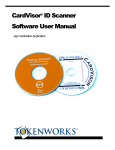
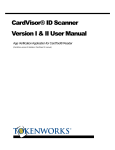
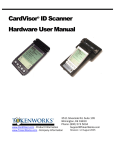


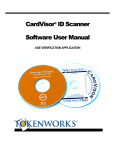

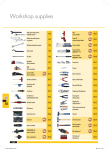
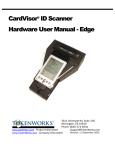
![IDVisor Hardware User Manual [Rev 1.1]](http://vs1.manualzilla.com/store/data/005787323_1-ba2f62bd59c5cdea456b5da531a1d222-150x150.png)


